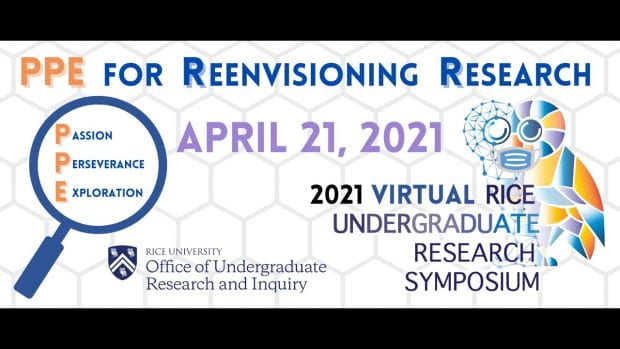Why RURS remains the premier event for undergraduates across all disciplines to present their research projects
Lillian Wieland’s freshman-year presentation for the Rice Undergraduate Research Symposium (RURS) “went terribly,” as she recalls it. The Brown College philosophy major almost didn’t return her sophomore year to present the research she’d been doing on meaning-making at the end of life.

As a peer research advisor for OURI, Lillian Wieland encourages her fellow undergrads to pursue research and present at events like RURS.
But with the encouragement of her mentors in the Medical Humanities program and the Office of Undergraduate Research and Inquiry (OURI), she entered the 2020 RURS after all — and won in the School of Humanities category.
“I don’t know how I would have even had the confidence to present at RURS last year otherwise,” Wieland said. “I’ve had countless mentors at Rice along the way.”
This year, Wieland entered and won once again, this time in the School of Humanities Oral Presentation category, for work that is a continuation of her ongoing research into death and dying: “The Baggage of Wellbeing: Freedom Through Meaning Making at the End of Life.”
Over 175 students came together virtually to present their work at the 2021 symposium on April 21, which took place in a daylong online environment complete with live presentations and judges’ feedback. Winners, listed in full below, were announced in an online ceremony April 23.
Wieland attributes her back-to-back wins to that same mentorship, as well as the Medical Humanities practica she took under such professors as Beverly Mitchell and John Mulligan, which pushed students to share their research.
“It’s just so important,” Wieland said. “A lot of students do all this incredible work, and to just hold on to it and not show people this amazing thing that you did is just sad.”
Having pushed past a rocky start, Wieland now stresses the value in presenting at such a supportive symposium as RURS. Students don’t have to compete in order to share their work and, within competitions, the judges offer the sort of thoughtful, constructive criticism that’s valuable for honing your research. Networking can be an awkward endeavor, but at RURS it’s a natural byproduct of oral and poster presentations alike.
Now in her junior year, Wieland is serving as a peer research ambassador with OURI, which hosts RURS as a part of its mission to assist Owls in pursuing and presenting research during their undergrad years. As an OURI ambassador, Wieland said she encourages her peers to reach out to faculty and discover mentors who will help them pursue their passions.
“The ability of Rice to connect you with people doing incredible work in the Houston area is beyond what I ever expected,” said Wieland.
Her own research into end-of-life practices and the ethical dimensions behind defining someone’s “quality of life” has led her to work with doctors and scholars at Texas Children’s Hospital and the Institute for Spirituality and Health at the Texas Medical Center. She even recently presented a paper to the Departures in Critical Qualitative Research journal, where it was accepted as the closing essay for its upcoming issue, and a panel along with an abstract at the International Health Humanities Consortium in late March.
Through her Medical Humanities pathway, Wieland plans on attending medical school and is considering work in palliative care or oncology.
“But don’t worry, humanities research is not going to be abandoned,” said Wieland, who’s already established meaningful connections with other end-of-life scholars as a result of the work she’s done at Rice. “It’s No. 1 — whatever specialty I’m going into, I have to have time to continue my research.”
Other winning entries in this year’s RURS included Team Award recipients Will Mundy, a Sid Richardson College senior, and Shryans Goyal, a Will Rice College senior, who explored novel approaches to diagnosing COVID-19 by listening to patients’ coughs — a project that also won second place at this year’s Rice Datathon.
Wiess College senior Ashley Snell, who is double majoring in history and psychology, took home this year’s Jenessa Shapiro Award for her poster presentation on “The Effects of Tension on College-Aged Children of Immigrants.”
Jenessa Shapiro ’02 founded the first RURS 19 years ago and was a premier researcher and faculty member at UCLA before her death in 2018. Introduced last year, the Shapiro Award recognizes curiosity, ingenuity, creativity and hard work — the ideals of the scientific enterprise exhibited by Shapiro during her time at Rice.
The following students represent the top 10% of competitive entries and top presenters in each award category for the 2021 RURS:
- Joseph Asfouri, Engineering
- Hannah Boyd, School of Natural Sciences Poster Presentation Winner
- Rose Click, School of Social Sciences Oral Presentation Winner
- Aman Eujayl, School of Engineering Oral Presentation Winner
- Brandon Khek, Natural Sciences
- Hociel Landa, School of Engineering Poster Presentation Winner
- Will Mundy and Shryans Goyal, Team Award Winner
- Pujita Munnangi, Engineering
- Stephen Peng, Natural Sciences
- Sarah Preston, Natural Sciences
- Kristen Rabbitt, School of Natural Sciences Poster Presentation Winner
- Julia Shi, School of Humanities Poster Presentation Winner
- Ashley Snell, Jenessa Shapiro Award Winner, School of Social Sciences Poster Presentation Winner
- Jessica Su, Natural Sciences
- Lillian Wieland, School of Humanities Oral Presentation Winner
- Brendan Wong, Natural Sciences
- Jim L. Zhang, Natural Sciences


